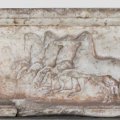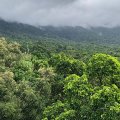A University of Queensland expert who pioneered research linking climate change projections with coral reef distress is the 2008 Smart State Premier’s Fellow.
Professor Ove Hoegh-Guldberg is the third UQ researcher to win the government’s top science prize, now in its third year.
He was one of the world’s first scientists to show how projected changes in global climate threaten coral reefs including Australia’s Great Barrier Reef.
“For some time now Professor Hoegh-Guldberg has been saying that unless we act to protect the Great Barrier Reef, we could see a situation where in 30 years’ time we won’t have much of our wonderful Reef left,” Premier Anna Bligh said as she announced the award at UQ in Brisbane today (May 21, 2008).
With Professor Hoegh-Guldberg leading a scientific session at an important climate change and oceans conference in Spain, Premier Bligh presented the award to his partner in research and life, Dr Sophie Dove.
The five-year fellowship gives a boost of more than $2.5 million to Great Barrier Reef research by Professor Hoegh-Guldberg and a large team. The Queensland Government’s $1.25 million contribution is matched by UQ, and the Great Barrier Reef Foundation, the Reef and Rainforest Research Centre and the Great Barrier Reef Marine Park Authority are also sponsors.
UQ Vice-Chancellor Professor Paul Greenfield congratulated Professor Hoegh-Guldberg and commended the Queensland Government for continuing to recognise the vital need to fund researchers and their projects as well as their laboratories and equipment.
“Professor Hoegh-Guldberg has long been ahead of his time,” Professor Greenfield said.
“Twenty years ago he was showing how rising temperatures caused coral bleaching, and in 1999 he became the first scientist to accurately link climate projections with a global pattern of coral distress.”
Professor Hoegh-Guldberg said the overall aim of the fellowship will be better Great Barrier Reef management, based on strategies emanating from the latest science.
“Over the past decade elevated sea temperatures have driven several mass coral bleaching events that affected more than 60 percent of the Great Barrier Reef each time,” he said.
“Coral disease, another consequence of increasing environmental stress, has increased 400 percent over recent years.
“According to several long-term studies, the abundance of coral cover is declining at a rate of one to two percent a year. If we let this continue there really won’t be much left in 30 years’ time.
“Through this fellowship I hope to capitalise on the vast amount of available information, to take Australia to the next level of understanding climate change and how we can deal with it.”
Professor Hoegh-Guldberg will lead one of the world’s largest networks of scientists, research organisations, and government and industry representatives. Much of the new work will be done at The University of Queensland’s Heron Island Research Station using the latest technology in wireless sensor networks provided as part of the $16 million Great Barrier Reef Ocean Observing System led by the Australian Institute of Marine Science.
“If we pull our resources together we can slow and even reverse the worrying trends. What we need is strong mitigation of CO2 emissions at the national and international level coupled with science-based solutions to increase the resilience of the Great Barrier Reef to climate change,” he said.
The new project will have three foci:
- the dynamics of sea temperature, which impact on coral bleaching and disease;
- processes within the water column, which will be mapped using satellite ocean colour in order to improve knowledge of how climate change affects the whole Reef ecosystem; and
- studying ocean acidification, with the aim of creating the world’s first map of a large coral reef system, which will indicate areas of high risk and natural resilience from climate change.
Professor Hoegh-Guldberg founded UQ’s Centre for Marine Studies and is Deputy Director of the Australian Research Council Centre of Excellence for Coral Reef Studies. His achievements in recent years include attracting more than $25 million from the World Bank and Global Environment Facility for a global coral reef project that involves researchers and students from 20 countries and is coordinated by UQ. He was lead author of a report which made the cover of the December 2007 issue of the journal Science, and showed that coral reefs will disappear within decades if levels of atmospheric carbon dioxide continue to rise.
Premier Bligh announced the fellowship during an event at UQ’s Institute for Molecular Bioscience, where she also announced a $300,000 fellowship for UQ Associate Professor of Paediatrics and Child Health, Professor Anne Chang.
Professor Chang will target her three-year Queensland Clinical Research Fellowship at improving the management of childhood cough. Professor Chang is also Paediatric Respiratory Physician at Royal Children's Hospital (Brisbane) and Head of Child Health at the Menzies Health School (Darwin).
Media can download high resolution images of Professor Hoegh-Guldberg and some of his projects at: http://omc.uq.edu.au/images/Ove/
The winner of the first Smart State Premier’s Fellowship, in 2006, was UQ’s Professor Ian Frazer, cervical cancer vaccine co-inventor and Director of the Diamantina Institute for Cancer, Immunology and Metabolic Medicine. The 2007 winner was Professor Mandayam Srinivasan of UQ’s Queensland Brain Institute whose research on insect vision is being applied to navigation and robot technology.
Media contacts: Ove Hoegh-Guldberg 61 401 106 604 Fiona Kennedy 617 3365 6060 / 61 413 380 012
.jpg)



